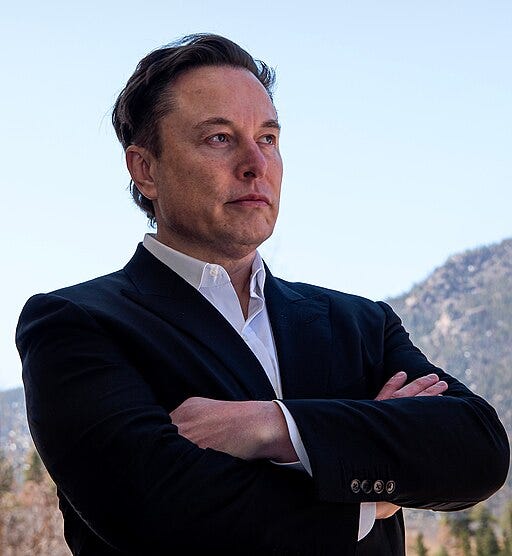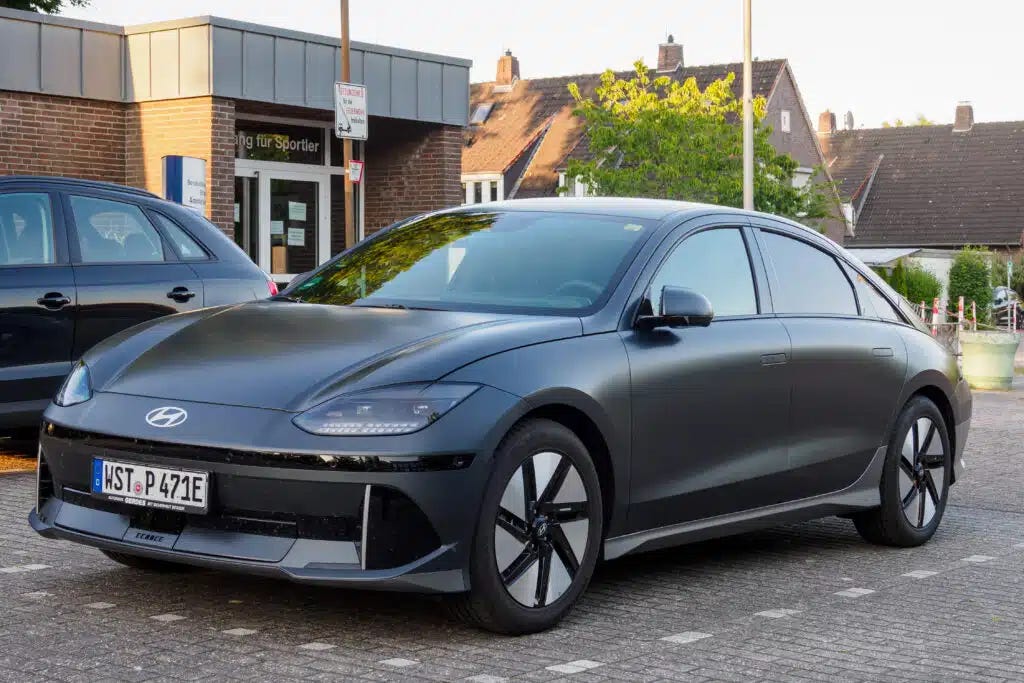News Round-Up: EU Pressures X by Targeting All of Musk's Assets, Inadequate Range of EVs and First Conviction for Thoughtcrime
Every week, the editorial team of Freedom Research compiles a round-up of news that caught our eye, or what felt like under-reported aspects of news deserving more attention.
Over the past week, the following topics attracted our attention:
EU targets all Elon Musk's assets to get control over X.
Test shows the driving range of EVs up to half less than car producers promise.
British veteran fined by court for praying silently near an abortion clinic.
Germany: even left-wing politicians start to admit mass immigration is a problem.
China makes military training compulsory for children, and college students.
EU targets all Elon Musk's assets to get control over X
The European Union has warned X that it may calculate fines against the Elon Musk owned social-media platform X by including revenue from Elon Musk’s other businesses, including Space Exploration Technologies Corp. (SpaceX) and Neuralink Corp., Bloomberg reports. This would significantly increase the potential penalties for what the Commission describes as potentially violating content moderation rules.
Under the EU’s Digital Services Act (DSA), the bloc can slap online platforms with fines of as much as 6% of their yearly global revenue for failing to tackle what is deemed as illegal content and disinformation by the authorities. Regulators are considering whether sales from SpaceX, Neuralink, xAI and the Boring Company, in addition to revenue generated from the social network, should be included to determine potential fines against X, people familiar with the matter said, asking not to be identified because the information isn’t public.
However, the commission spokesperson Thomas Regnier's comments also hint that this approach might be taken. “The obligations under the DSA are addressed to the provider of the very large online platform or very large online search engine,” commission Regnier said. “This applies irrespective of whether the entity exercising decisive influence over the platform or search engine is a natural or legal person.” Regnier didn’t elaborate further on this specific case.
This would mean that protecting freedom of expression could come again for a very high price for Musk. For example, in the case of X, it can be estimated that the maximum fine under the DSA would amount to around €200 million if considered upon 2023 turnover. However, if you add Musk's SpaceX, the company behind Musk's satellite internet service Starlinkg and rocket development, with a turnover of $4.6 billion (€4.14 billion) in 2022 – the company has not yet released the 2023 figures – the 6% would raise the potential fine another quarter of a million euros. And Musk has other companies with similar capacities. The only company excluded would be the EV producer Tesla as it is not solely owned by Musk, as it is publicly traded.

In a bad way, Brazil has been the role model in subjecting X to the demands of censorship. Significantly, it was there that Musk's other companies were also targeted, and X finally gave in in a dispute. The Brazilian authorities wanted X to censor pro-opposition users on the grounds of combating misinformation and disinformation. These demands were initially refused by the platform. In response, Alexandre de Moraes, a member of the country's highest court, imposed heavy fines on X and threatened the company's official representative with prison. X closed its Brazilian office in August, leaving no employees to be threatened. However, some time later, at the end of August, de Moraes banned X from Brazil altogether and seized the Brazilian assets of Musk's other companies, such as SpaceX. Brazil is one of the largest markets for X and the social media platform is estimated to have up to 40 million users there. So in the second half of September, X started to look for a solution. The solution was that the platform agreed to censor users and remove accounts referred to by the Brazilian authorities, as well as to pay the fines - a total of €4.6 million. X's ban in Brazil was lifted.
We also wrote about how a growing number of politicians in both the US and Europe are calling for X to be 'brought under control', in other words, for the platform to be forced to submit to the censorship demanded by the authorities. Among other things, there are suggestions that Musk could be threatened with arrest and X banned from the European Union.
The commission hasn’t yet decided whether to penalize X, and the size of any potential fine is still under discussion, the people familiar with the matter said to Bloomberg. According to the article, penalties may be avoided if X finds ways to satisfy the watchdog’s concerns. This would mean that it abides to demands to censor its users.
Test shows the driving range of EVs up to half less than promised
Electric vehicle enthusiasts say shortcomings like inadequate range and high prices have been eliminated, but the latest EVs to hit the market show that is far from the case, Forbes writes.
The Lexus RZ 300e, Kia KV9, Peugeot 3008e, and Hyundai Ionic 6 are among the latest EVs to be launched in Europe and prospective buyers will assume they represent the very best available technology. Yet all four fail the autoroute range test, as did their predecessors.
The Lexus RZ 300e, for instance, claims a range of “up to” 297 miles (478 km), but the battery only filled to an average of 224 miles (360 km). In autoroute cruising mode the range was slashed by 39%.
The Peugeot 3008e claimed a range of 326 miles (527 km), but could only go half the mileage.
The Kia EV9 battery averaged consistently around the claim of 313 miles (504 km), but actually lasted for 50% less. The Hyundai Ioniq 6’s battery filled up to an average of 270 miles (435 km) compared with the claim of 384 miles (610 km), in a 30% shortfall.

These negative results shouldn’t be a surprise because of the basic science. Emissions Analytics CEO Nick Molden put the problem this way. “Air resistance (drag force) is proportional to the square of the speed. Drag will correlate (negatively) with range. So range will decline more than proportionately as speed increases,” Molden said. “All other things being equal, the drag force will be 164% higher at 130 km/h than at 80 km/h (50 mph) which is a speed increase of 63%,” Molden said.
British veteran fined by court for praying silently near an abortion clinic
A British army veteran has been convicted for praying silently near an abortion clinic, The European Conservative writes. Adam Smith-Connor, who served in Afghanistan, was prosecuted for breaching a ban on protests within a buffer zone around a clinic in Bournemouth, Dorset, in November 2022. His head was bowed and hands were clasped as he prayed for his unborn son Jacob, whom he now regrets aborting more than two decades ago. Reporting on the case, the Alliance Defending Freedom (ADF) legal advocacy group said the conviction was “the first known conviction of a ‘thoughtcrime’ in modern British history.” The Court sentenced Smith-Connor to a conditional discharge and ordered him to pay prosecution costs of £9,000 (€10,770), just for praying in his head for three minutes. The group is examining the possibility of appealing the conviction.
During the trial at Poole Magistrates’ Court, Smith-Connor denied the offence of failing to comply with the Public Space Protection Order, but District Judge Orla Austin said that what he did was “deliberate.” The news comes as Keir Starmer’s Labour government is considering rolling out a ban on silent prayer outside abortion clinics.
Germany: even left-wing politicians start to admit mass immigration is a problem
Bremen’s immigration policy has been a disaster and is contributing to housing and social problems, including an exploding crime rate, said Bremen’s Interior Senator Ulrich Mäurer of the far-left Social Democrats (SPD), Remix News writes.
The city is “completely overwhelmed with taking in so many people,” said Mäurer while speaking with the German newspaper Weser-Kurier. He said that the problems have “worsened.”
Bremen is arguably the most left-wing major city in Germany and has been ruled by the Greens, SPD, and the Left Party for many years.
Mäurer has been there since the start, helping guide the city’s radical policy towards immigration. The 73-year-old has been in office for 16 years. It is only now that he blames “massive immigration” for the housing shortage and “enormous difficulties” in daycares, schools, and job sites. At the same time, he notes that crime is exploding.

However, not everyone is on board with Mäurer in Bremen. The Left Party said he is harming the “agreed line of a humanitarian migration and refugee policy.” Meanwhile, the Greens state that immigration is “an opportunity for the economic and social future of our state.”
Even within his own party, Bremen’s Mayor Andreas Bovenschulte (SPD) has a different view. He warned against “rhetorically heating up the debate, because that does not solve a single problem, but only poisons the social climate.”
Bremen has been one of the most open cities to mass immigration over the last decade. In 2018, the city declared itself a “safe haven,” and that designation is still in place. The declaration signed at the time states: “We welcome refugees – and are ready to take more people.”
China makes military training compulsory for children, college students
The Chinese regime has revised its National Defense Education Law, which took effect in September this year, The Epoch Times wrote.
The revised law emphasizes that national defense education should be guided by the CCP’s ideology, centered around “socialist core values,” and aimed to “enhance the national defense awareness of all citizens.”

The revisions allow the branches of the military of the Chinese Communist Party (CCP), the People’s Liberation Army (PLA), to station in universities, colleges, and high schools across China to conduct a nationwide military education and training program approved by CCP’s state council and the party’s central military commission for recruitment. The second draft of the revised bill aims to “hone students’ willpower, enhance organizational discipline, and improve the level of military training.”
It requires that all agencies, institutions, organizations, and entities in society conduct national defense training. The revision emphasized the importance of conscription. The article added to the newly revised law stipulates that “national defense education” in schools should be combined with “the promotion of military service” to enhance students’ “military service awareness.”



How is it that Elon Musk gets attacked personally on all of this? Just because he supports free speech? Would the EU go after Zuckerberg's charities if Facebook refused? I find it odd that governments think it's ok to go after completely unrelated companies.
Would serve them right if SpaceX refused to launch their satellites for them, but I'm guessing they'd just seize those assets too. Because they've got the power to do it. Not because it's legal.